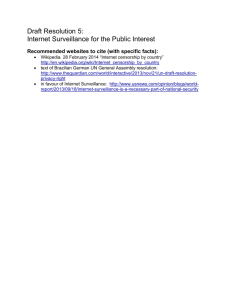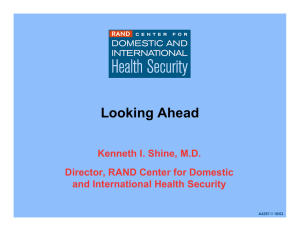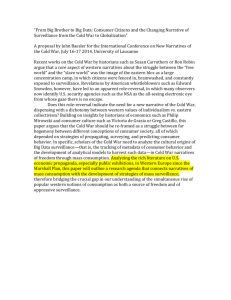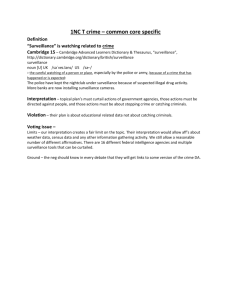When Medicines Fail Drug Resistance: Filling the Information Vacuum
advertisement
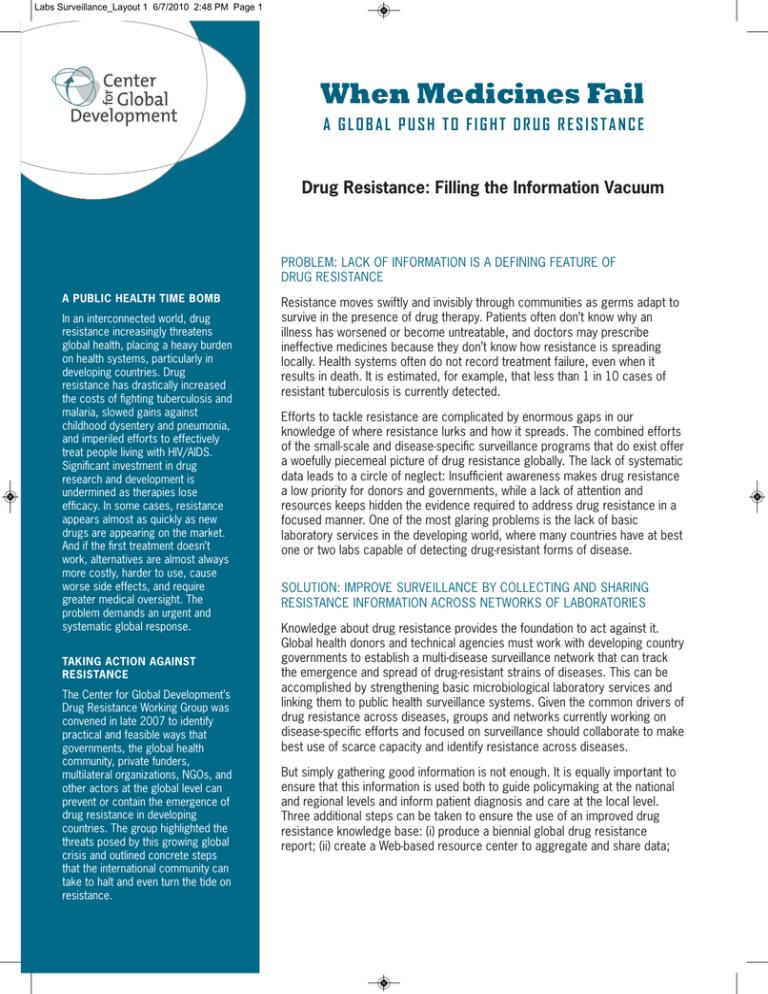
Labs Surveillance_Layout 1 6/7/2010 2:48 PM Page 1 When Medicines Fail A GLOBAL PUSH TO FIGHT DRUG RESISTANCE Drug Resistance: Filling the Information Vacuum PROBLEM: LACK OF INFORMATION IS A DEFINING FEATURE OF DRUG RESISTANCE A PUBLIC HEALTH TIME BOMB In an interconnected world, drug resistance increasingly threatens global health, placing a heavy burden on health systems, particularly in developing countries. Drug resistance has drastically increased the costs of fighting tuberculosis and malaria, slowed gains against childhood dysentery and pneumonia, and imperiled efforts to effectively treat people living with HIV/AIDS. Significant investment in drug research and development is undermined as therapies lose efficacy. In some cases, resistance appears almost as quickly as new drugs are appearing on the market. And if the first treatment doesn’t work, alternatives are almost always more costly, harder to use, cause worse side effects, and require greater medical oversight. The problem demands an urgent and systematic global response. TAKING ACTION AGAINST RESISTANCE The Center for Global Development’s Drug Resistance Working Group was convened in late 2007 to identify practical and feasible ways that governments, the global health community, private funders, multilateral organizations, NGOs, and other actors at the global level can prevent or contain the emergence of drug resistance in developing countries. The group highlighted the threats posed by this growing global crisis and outlined concrete steps that the international community can take to halt and even turn the tide on resistance. Resistance moves swiftly and invisibly through communities as germs adapt to survive in the presence of drug therapy. Patients often don’t know why an illness has worsened or become untreatable, and doctors may prescribe ineffective medicines because they don’t know how resistance is spreading locally. Health systems often do not record treatment failure, even when it results in death. It is estimated, for example, that less than 1 in 10 cases of resistant tuberculosis is currently detected. Efforts to tackle resistance are complicated by enormous gaps in our knowledge of where resistance lurks and how it spreads. The combined efforts of the small-scale and disease-specific surveillance programs that do exist offer a woefully piecemeal picture of drug resistance globally. The lack of systematic data leads to a circle of neglect: Insufficient awareness makes drug resistance a low priority for donors and governments, while a lack of attention and resources keeps hidden the evidence required to address drug resistance in a focused manner. One of the most glaring problems is the lack of basic laboratory services in the developing world, where many countries have at best one or two labs capable of detecting drug-resistant forms of disease. SOLUTION: IMPROVE SURVEILLANCE BY COLLECTING AND SHARING RESISTANCE INFORMATION ACROSS NETWORKS OF LABORATORIES Knowledge about drug resistance provides the foundation to act against it. Global health donors and technical agencies must work with developing country governments to establish a multi-disease surveillance network that can track the emergence and spread of drug-resistant strains of diseases. This can be accomplished by strengthening basic microbiological laboratory services and linking them to public health surveillance systems. Given the common drivers of drug resistance across diseases, groups and networks currently working on disease-specific efforts and focused on surveillance should collaborate to make best use of scarce capacity and identify resistance across diseases. But simply gathering good information is not enough. It is equally important to ensure that this information is used both to guide policymaking at the national and regional levels and inform patient diagnosis and care at the local level. Three additional steps can be taken to ensure the use of an improved drug resistance knowledge base: (i) produce a biennial global drug resistance report; (ii) create a Web-based resource center to aggregate and share data; Labs Surveillance_Layout 1 6/7/2010 2:48 PM Page 2 and (iii) have the World Health Organization provide direction to countries on when and how to report on the emergence or transmission of drug-resistant forms of diseases. AN INTERLOCKING SYSTEM FOR DRUG RESISTANCE SURVEILLANCE Functions: Monitor drug resistance at the national level Share with appropriate regulatory authorities Share data with regional/global partners Led by: Ministries of Health Functions: Test for and monitor drug resistance at the local level Led by: Hospitals, Public Health Surveillance Systems DISTRICT-LEVEL LABS NATIONAL PUBLIC HEALTH LABS TECHNICAL ASSISTANCE HUBS Functions: Support lab capacity building, record management, local reporting, national analysis and sharing of data Led by: WHONET, CDC, Global Lab Initiative INFORMAL SURVEILLANCE SYSTEMS SUPRANATIONAL REFERENCE LABS Functions: Using high-end technologies, test for drug resistance and integrate with regional surveillance networks Led by: TB SRLN, HIV ResNet, WWARN, CDC GLOBAL COORDINATOR & WEB PORTAL Functions: Convene and advise stakeholders Facilitate global communication and funding Manage reporting/alert system Develop data collection and sharing protocols Led by: WHO, e.g., IHR and Global Alert and Response Functions: Facilitate and monitor real-time reports of drug resistance Led by: ProMed, HealthMap RELATED RESOURCES • HealthMap (www.healthmap.org) and ProMed (www.promedmail.org) are examples of ‘informal,’ real-time disease surveillance platforms. • WHONET (www.whonet.org) is the only global initiative focused specifically on giving microbiology labs the tools they need to conduct drug resistance surveillance. • Disease-specific networks focused on surveillance and information sharing include: HIV ResNet (www.who.int/hiv/topics/drugresistance/hivresnet/en/) WorldWide Antimalarial Resistance Network (www.wwarn.org) Global Laboratory Initiative, focused on TB (www.stoptb.org/wg/gli/) FOR MORE INFORMATION OR TO READ THE FULL REPORT, PLEASE VISIT www.WhenMedicinesFail.org or e-mail drug_resistance@cgdev.org. The Center for Global Development is an independent, nonprofit policy research organization that is dedicated to reducing global poverty and inequality and to making globalization work for the poor. For more information, go to: www.cgdev.org.

